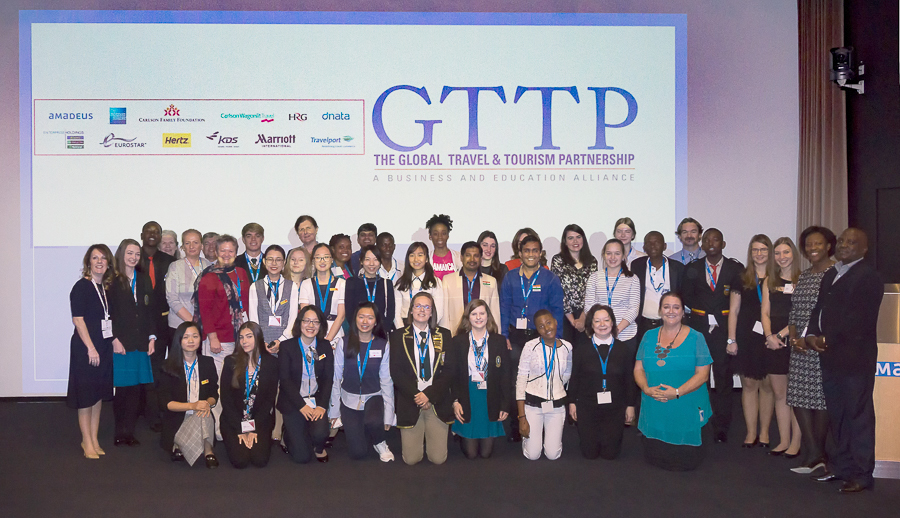The Global Travel and Tourism Partnership (GTTP) announced that 24 secondary and tertiary students from 12 countries were selected as 2017 Student Research Competition winners out of approximately 2,000 entries. The students presented their case study research findings at the GTTP’s annual student/teacher conference this November 27 – 28 in Nice, France.

The countries represented this year by the students and their accompanying teachers included: Brazil, China, France, Hong Kong, Hungary, India, Ireland, Jamaica, Kenya, Russia, South Africa, and Tanzania.
Student competition entrants research GTTP-assigned topics, which vary year to year. Working in teams, the students develop their skills in research, analytics, and communications, all of which are essential for a successful career in Travel & Tourism.
This competition is sponsored by the GTTP’s Global Partners and the Aldo Papone Endowment. In addition, Amadeus provided the conference facilities at its Executive Briefing Centre in Sophia Antipolis. Marriott International, another GTTP Global Partner, provided meals and hotel rooms at Le Méridien, Nice. The GTTP Global Partners Amex, dnata, Eurostar, HRG, Hertz and Travelport sponsored tables at this year’s event awards dinner.
Angelica Mkok, Head of Corporate Social Responsibility, Amadeus IT Group, commented: “Amadeus is proud to continue sponsoring the GTTP global educational program in travel and tourism. Supporting young people in their personal and professional development within this industry is a key priority for Amadeus. We enjoyed hosting again the Global Travel and Tourism Partnership annual awards ceremony and hearing inspiring ideas on Bleisure travel from this year’s finalists.”
Hemma Varma, Senior Manager, Social Impact & Global Responsibility Europe, Marriott International, said: “The work being done by GTTP is significantly helping to ensure thousands of students around the world are aware of the great opportunities our industry has to offer. We are happy to continue our tradition of supporting programs like the GTTP global educational program in travel in tourism. With 1 in 10 jobs tied to the hospitality industry worldwide, GTTP is helping to ensure a bright, fulfilling career path for many, and a pipeline of talent for our hotels.”
Michel Taride, Chair of the GTTP Advisory Board and Group President of Hertz International, said: “Many congratulations to this year’s GTTP student research winners, who prepared fascinating case studies on the opportunities for Bleisure tourism in their home country and the role that sustainability and technology plays in this area. GTTP has had an unwavering commitment over the past two decades to attract bright stars such as these young people to the travel and tourism industry to secure its future development.”
Nancy Needham, Executive Director, GTTP, added: “The students did an excellent job this year. The core mission of GTTP is to expose young people to the many different kinds of professional careers offered by the Travel & Tourism Industry. By changing the student research topic each year, we also introduce students to issues and trends affecting the industry and the people who work in it. We could not do all this without the involvement and support of the industry leaders who guide GTTP.”
The GTTP, established in 1996, currently operates in Brazil, Canada, China, France, Hong Kong, Hungary, India, Ireland, Jamaica, Kenya, Philippines, Russia, South Africa, Tanzania, and United Kingdom. Some 467,000 students participated in the GTTP. School systems provide teachers and classrooms. Approximately 1,500 local and international companies share their expertise with teachers and students and provide financial and in-kind support.
The international industry leaders currently supporting the GTTP are Amadeus, American Express, Carlson Wagonlit Travel, dnata, Enterprise Holdings, Eurostar, The Hertz Corporation, Hogg Robinson Group, KDS, Marriott International, and Travelport. Their executives serve on GTTP’s Advisory Board.
About GTTP
The Global Travel and Tourism Partnership is an industry philanthropic initiative to foster future talent and tackle the global skills shortage. The GTTP educates secondary and tertiary school students about careers in Travel and Tourism at a time when they are making career and education choices. The GTTP works in 15 countries in Europe, Africa, East Asia and North and South America. It serves some 667,000 students in more than 4,600 schools. For more about GTTP visit http://gttp.org or Facebook.